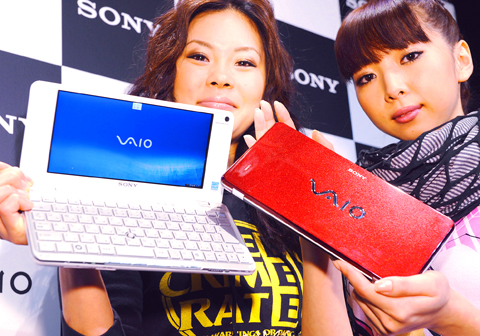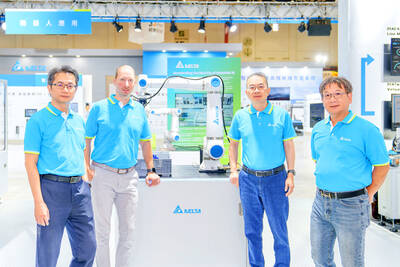Japanese consumer electronics maker Sony Corp yesterday introduced its high-priced alternative to the growing demand for netbooks — the VAIO P — at a product launch held simultaneously in Taipei, Tokyo and Las Vegas’ Consumer Electronics Show.
The VAIO P marks the multinational conglomerate’s foray into pocket PCs, as the company struggles to carve out a market niche to counter the netbook PC attack.
Taipei-based research and consulting group Topology Research Institute (拓墣產業), in a report released yesterday, forecast that global netbook PC shipments would reach between 27.25 million and 32 million this year.

PHOTO: AFP
In response to Topology’s report, Hiroyuki Oda, general manager of Sony Corp’s VAIO business group, told reporters yesterday: “We acknowledge the netbook demand, but we will not enter the low-priced netbook market.”
Oda said that since its founding in 1946, Sony has always been at the forefront of the consumer technology revolution, including the introduction of the concept of music-on-the-go with the launch of the Walkman.
“Our focus has always been on creating value through design, innovation and specialization. Without specialization, there would have been no VAIO,” Oda said.
Oda stressed that the 8-inch VAIO P is a pocket PC — and not a netbook.
However, Taipei-based researcher Market Intelligence Center (MIC) defines netbook PCs as products with display sizes ranging from between 7 inches and 10.2 inches, while notebook PCs are equipped with displays 10.4 inches and above. In short, the VAIO P falls into MIC’s netbook category in terms of display size.
Still, some industry watchers classify netbooks as low cost, mini-notebooks that retail between US$300 and US$400 per unit. The VAIO P series are priced between NT$26,800 and NT$36,800 (US$800 and US$1,100).
Sony is not worried that the VAIO P might cannibalize its existing ultra-portable TT and Z notebook series, since these two lines are even more distinctly priced than the P, with 11-inch and 13-inch displays respectively.
In the near term, the company has no plans of following netbook vendors’ popular tactic of collaborating with local telecom operators to promote their product through bundled sales (netbook + telecom subscription plan), Oda said.
Sony’s new pocket PC, which includes all the latest notebook add-ons, runs on Intel’s Atom Z processor and features an “Instant On” technology that allows users to boot up one program (such as the Internet browser) instead of running the entire operating system.
This same “Instant On” technology, developed by Taiwanese software company Device VM Inc (達維飛碼 ), has attracted a lot of interest at the Consumer Electronics Show in Las Vegas, Topology said.
Netbook vendors such as Asustek Computer Inc (華碩), Acer Inc (宏碁) and Hewlett-Packard Co are embracing this time-saving platform, and rolling out quick-start netbook PCs. Even Lenovo Group Ltd (聯想) recently included “Instant On” in its latest netbook line, Topology said yesterday.
As the economic downturn spreads, global demand for consumer PCs is also slowing. Oda yesterday did not talk about sales forecasts for the VAIO P, saying Sony was still observing consumer response to the new product.
“Although the global financial crisis is hurting sales worldwide, Asia Pacific remains a strong area of growth for us, whereas developed countries such as US, Europe, and Japan are showing signs of a slowdown,” Oda said.

SETBACK: Apple’s India iPhone push has been disrupted after Foxconn recalled hundreds of Chinese engineers, amid Beijing’s attempts to curb tech transfers Apple Inc assembly partner Hon Hai Precision Industry Co (鴻海精密), also known internationally as Foxconn Technology Group (富士康科技集團), has recalled about 300 Chinese engineers from a factory in India, the latest setback for the iPhone maker’s push to rapidly expand in the country. The extraction of Chinese workers from the factory of Yuzhan Technology (India) Private Ltd, a Hon Hai component unit, in southern Tamil Nadu state, is the second such move in a few months. The company has started flying in Taiwanese engineers to replace staff leaving, people familiar with the matter said, asking not to be named, as the

The prices of gasoline and diesel at domestic fuel stations are to rise NT$0.1 and NT$0.4 per liter this week respectively, after international crude oil prices rose last week, CPC Corp, Taiwan (台灣中油) and Formosa Petrochemical Corp (台塑石化) announced yesterday. Effective today, gasoline prices at CPC and Formosa stations are to rise to NT$27.3, NT$28.8 and NT$30.8 per liter for 92, 95 and 98-octane unleaded gasoline respectively, the companies said in separate statements. The price of premium diesel is to rise to NT$26.2 per liter at CPC stations and NT$26 at Formosa pumps, they said. The announcements came after international crude oil prices

STABLE DEMAND: Delta supplies US clients in the aerospace, defense and machinery segments, and expects second-half sales to be similar to the first half Delta Electronics Inc (台達電) expects its US automation business to remain steady in the second half, with no signs of weakening client demand. With demand from US clients remaining solid, its performance in the second half is expected to be similar to that of the first half, Andy Liu (劉佳容), general manager of the company’s industrial automation business group, said on the sidelines of the Taiwan Automation Intelligence and Robot Show in Taipei on Wednesday. The company earlier reported that revenue from its automation business grew 7 percent year-on-year to NT$27.22 billion (US$889.98 million) in the first half, accounting for 11 percent

A German company is putting used electric vehicle batteries to new use by stacking them into fridge-size units that homes and businesses can use to store their excess solar and wind energy. This week, the company Voltfang — which means “catching volts” — opened its first industrial site in Aachen, Germany, near the Belgian and Dutch borders. With about 100 staff, Voltfang says it is the biggest facility of its kind in Europe in the budding sector of refurbishing lithium-ion batteries. Its CEO David Oudsandji hopes it would help Europe’s biggest economy ween itself off fossil fuels and increasingly rely on climate-friendly renewables. While